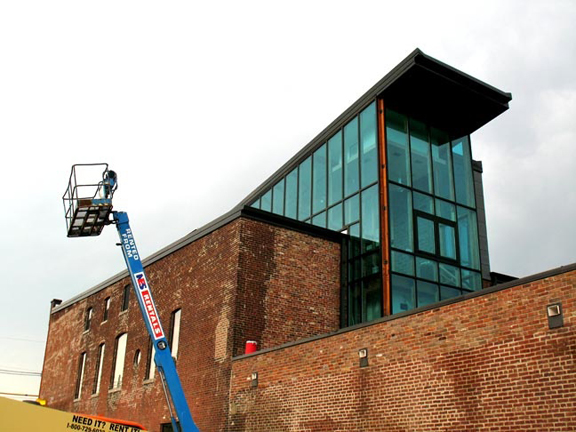The NuLu district:
Louisville couple bringing green design and urban revitalization to East Market
| Written by Steve Kaufman | The Voice tribune | |
| Wednesday, 11 March 2009 |
Gill Holland is a film producer. His independent films have appeared at festivals like Sundance and TriBeCa, featuring stars-to-be like Kate Hudson, Edie Falco, Adrian Grenier and Melissa Leo.
He also produces music under the SonaBLAST! label. Mark Geary’s “Ghosts” album went gold in 2004.
But his biggest current production is redeveloping an entire neighborhood in Louisville’s East Market District, turning a historic but faded area into a hip, trendy and sustainable vision he’s calling NuLu (think “new Louisville”). Any similarity to New York’s SoHo (which derived its name from being south of Houston Street)is entirely intentional. That Manhattan neighborhood had vacant factory buildings and dark, empty, sinister streets until people began buying inexpensive loft space in the 1970s. Within a decade, the area had been turned into a thriving neighborhood of apartments, galleries, shops and restaurants. If it could happen in New York, why not Louisville?
“Louisville is one of America’s great hidden treasures,” Holland said. “How come nobody knows about this town? Great architecture, beautiful green spaces, art, theater, orchestra and an extraordinary collection of outstanding restaurants. It deserves a ‘stroll district’ where people can park their car and visit a gallery, buy some antiques, browse through a market and then get a terrific meal.”
 Holland knows about great cities, having lived in Paris and New York. After earning his law degree in his native North Carolina, he went to Paris to practice law. One of the firm’s clients was a film producer and he became drawn to the business. That led to an internship in New York and then to his own production company, The Group Entertainment.
Holland knows about great cities, having lived in Paris and New York. After earning his law degree in his native North Carolina, he went to Paris to practice law. One of the firm’s clients was a film producer and he became drawn to the business. That led to an internship in New York and then to his own production company, The Group Entertainment.
It was in New York that he met Louisvillian Augusta Brown, who was getting her master’s degree in urban planning at Columbia University. Brown had a commitment to sustainability and a desire to create a year-round public market in Louisville that, like Pike Place in Seattle or Reading Market in Philadelphia, would have permanent stalls selling food, wine, flowers and artwork.
The cornerstone for the couple’s vision for NuLu is the Green Building, a 110-year-old classic at 732 E. Market St. between Clay and Shelby streets. Like a lot of 19th century buildings on the street, its weathered red brick walls and cast iron framings are the first things you see.
Then you notice, rising up from the roof, a sloping 21st century structure of glass that lets natural light flood into the space. That, along with the solar panels on the roof and the huge, silver rain barrels on the side of the building, shows that this is a building with a conscience.
What you don’t see are the recycled blue jeans that function as insulation; the carbon dioxide monitors that tell the vents to begin pumping in fresh air because people have entered the room; the photovoltaic cells on the roof that convert sunlight into energy, generating current to power the building.
“On a sunny day, we might incur zero energy costs in here,” Holland said.
With the Green Building as their pivot, the Hollands are reclaiming buildings on the side and in the back to fulfill their mission of being the first neighborhood to gain platinum certification by the U.S. Green Building Council’s LEED (Leadership in Energy and Environmental Design) program.
They also intend to build the Jefferson Public Market, using the surrounding buildings and alleys to create an urban version of a farmers market, supporting local purveyors and artisans and bringing activity and diversity back into the city.
The Green Building is slowly filling up with tenants. Both Hollands have offices on the third floor, along with marketing consultants Suzanne Oldham and Rolf Provan. And, on the ground floor, Steven and Michael Ton – owners of the popular Basa restaurant on Frankfort Avenue – are about to open a smaller restaurant called 732 Social.
Investment in the current economy worries Holland, but only a little.
“Louisville didn’t have the big boom in the 1980s and ’90s that so many cities had, so it won’t have a big bust,” he said. “In fact, people from worse-hit parts of the country are looking to move here.”
In the meantime, the Hollands venture forth, driven by their commitment to the environment.
“We’ve taken so much from the earth,” he said. “It’s time to give back.”

